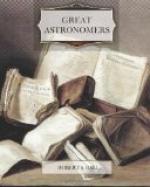The surroundings among which the young astronomer was reared afforded him an excellent training for that career on which he was to enter, and in which he was destined to attain a fame only less brilliant than that of his father. The circumstances of his youth permitted him to enjoy one great advantage which was denied to the elder Herschel. He was able, from his childhood, to devote himself almost exclusively to intellectual pursuits. William Herschel, in the early part of his career, had only been able to snatch occasional hours for study from his busy life as a professional musician. But the son, having been born with a taste for the student’s life, was fortunate enough to have been endowed with the leisure and the means to enjoy it from the commencement. His early years have been so well described by the late Professor Pritchard in the “Report of the Council of the Royal Astronomical Society for 1872,” that I venture to make an extract here:—
“A few traits of John Herschel’s boyhood, mentioned by himself in his maturer life, have been treasured up by those who were dear to him, and the record of some of them may satisfy a curiosity as pardonable as inevitable, which craves to learn through what early steps great men or great nations become illustrious. His home was singular, and singularly calculated to nurture into greatness any child born as John Herschel was with natural gifts, capable of wide development. At the head of the house there was the aged, observant, reticent philosopher, and rarely far away his devoted sister, Caroline Herschel, whose labours and whose fame are still cognisable as a beneficent satellite to the brighter light of her illustrious brother. It was in the companionship of these remarkable persons, and under the shadow of his father’s wonderful telescope, that John Herschel passed his boyish years. He saw them, in silent but ceaseless industry, busied about things which had no apparent concern with the world outside the walls of that well-known house, but which, at a later period of his life, he, with an unrivalled eloquence, taught his countrymen to appreciate as foremost among those living influences which but satisfy and elevate the noblest instincts of our nature. What sort of intercourse passed between the father and the boy may be gathered from an incident or two which he narrated as having impressed themselves permanently on the memory of his youth. He once asked his father what he thought was the oldest of all things. The father replied, after the Socratic method, by putting another question: ’And what do you yourself suppose is the oldest of all things?’ The boy was not successful in his answers, thereon the old astronomer took up a small stone from the garden walk: ’There, my child, there is the oldest of all the things that I certainly know.’ On another occasion his father is said to have asked the boy, ’What sort of things, do you think, are most alike?’ The delicate, blue-eyed boy,




